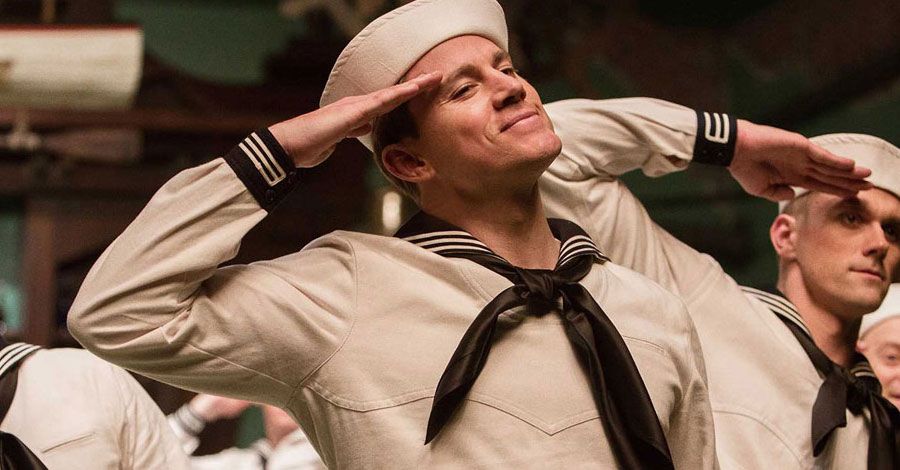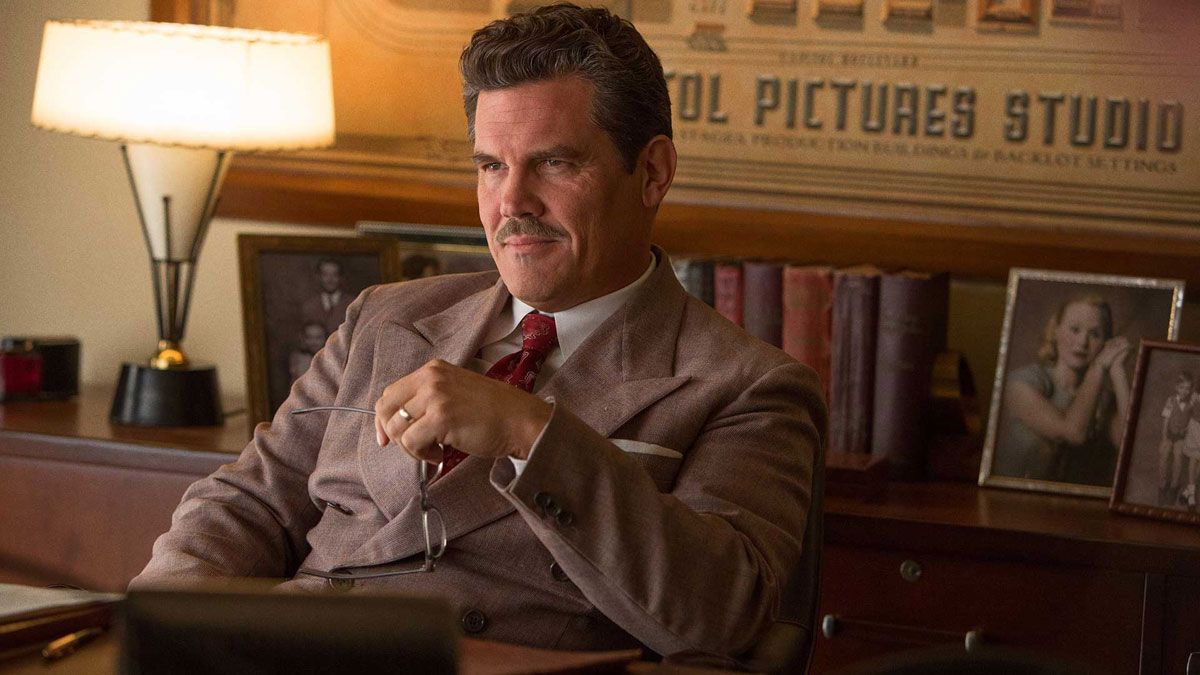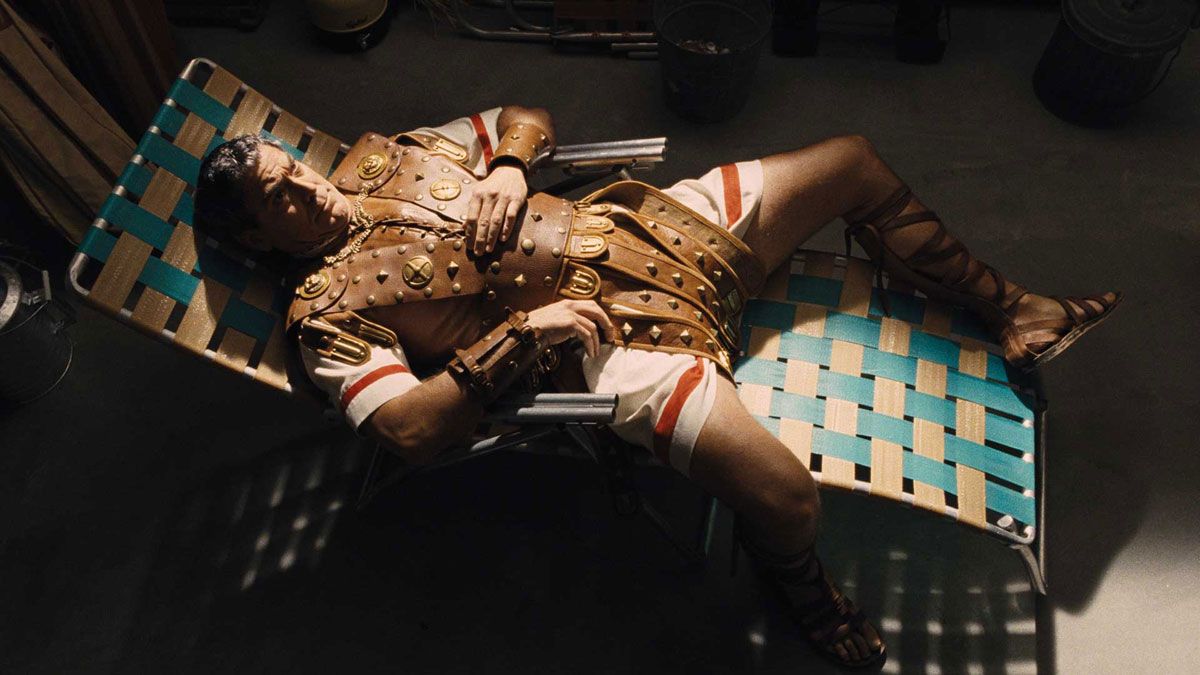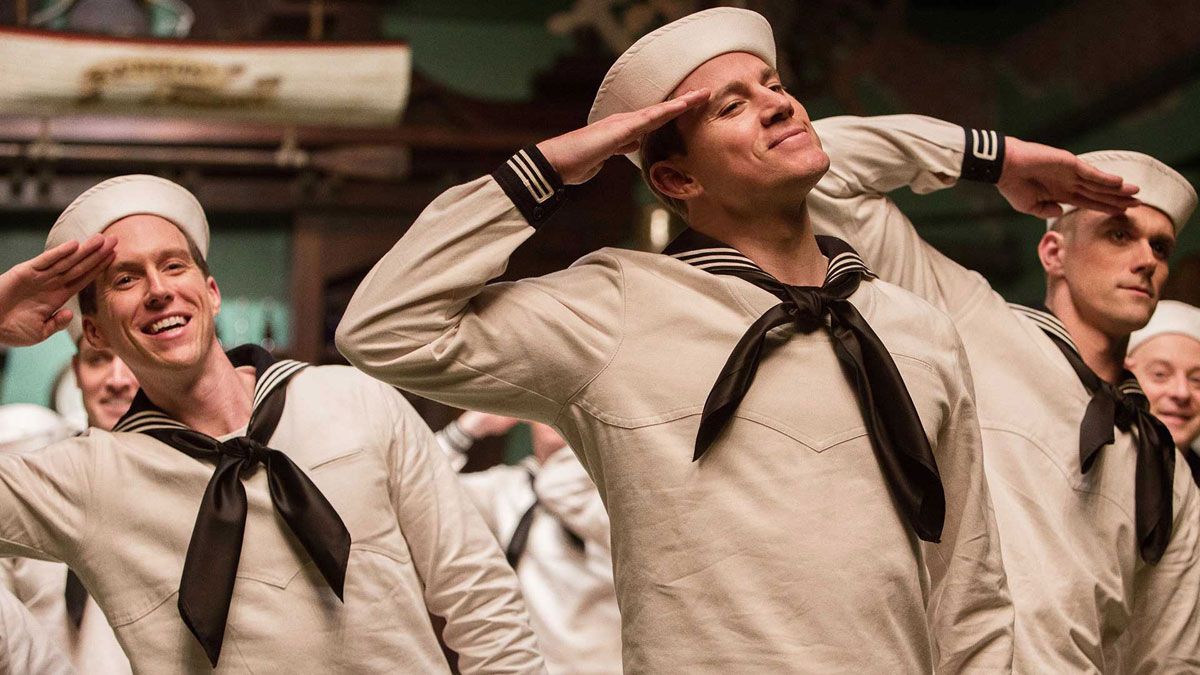If working on a Coen brothers film sounds like an actor's dream, that's because -- as the A-list stars of their latest project "Hail, Caesar!" attest -- it is.
The latest movie from the acclaimed directorial duo is set in the world of movies themselves. The film drops a Byzantine (or, perhaps more accurately, Lebowski-esque) array of twisting and turning and interconnected plotlines into 1950s Hollywood, where the studios ruled with an iron fist. Of course, they also employed shrewd and uncompromising "fixers" to cover up the consequences when naughty and less discriminating stars ran wild.
For "Hail, Caesar!," the Coens assembled a cast that mixes veteran members of the brothers repertoire like George Clooney ("O Brother Where Art Thou," "Intolerable Cruelty" "Burn After Reading") and Josh Brolin ("No Country For Old Men") with newcomers including Channing Tatum, Jonah Hill and Alden Ehrenreich. These five actors recently assembled to reflect with the press, including SPINOFF ONLINE, on their latest experience being, or becoming, part of the extended Coen family.
On how the film -- and its all-star cast -- came together:
George Clooney: After finishing "O Brother, Where Art Thou?," [the Coens] pitched me a movie called "Hail, Caesar!," basically about a fixer, but one of the characters was an idiot actor -- I wonder why they thought of me? -- who gets kidnapped by a bunch of Communists.
The only line they pitched was Alden's line, "This is bad for movie stars everywhere," which killed me, and then they never wrote the script. Every time I did press, I would say, "I'm doing a Coen brothers movie next, called 'Hail, Caesar!,'" and then Joel and Ethan would call me and say, "Stop saying that! We haven't written it." And then they called a couple years ago and said, "Okay, we wrote it, so let's go do it."
Josh Brolin: Since "No Country [For Old Men"], I've injected myself into their lives. Even other movies I wasn't involved with, I'd watch them edit because I really enjoy watching them go through their process. It's a very economical, educational process. And I remember asking them, when they were doing "[Inside] Llewyn Davis," what movie they were thinking about doing next, just out of curiosity. And they mentioned this movie and that [George] would most likely be involved in, even though they'd asked him about it 10 years ago.
I said, "Cool!" -- wanting to say, "If there's a part in there for me, I'd really enjoy working with you again. Maybe you could pay me more next time, since you always pay me nothing." And then, I got a call that said, "Do you want to do this thing?" [When George was gonna do] "O Brother," they were actually going to go see him. They would never come see me, but they do make a phone call. They do spend that money. And they said, "Would you be interested in maybe being involved in this movie?" I thought it was for a fairly small part,x until I read it.
Alden Ehrenreich: Obviously, it being the Coens, I love their films and wanted to be a part of it. And then I came in and read for them, and they laughed throughout the audition. And then I came back and read for them again. Then, I got a phone call and the casting director said, "Keep your phone on." I just figured they were going to call me and say, "Thank you for coming in, but you didn't get it."
So, I kept my phone on and a whole day went by, and then I went, "Well, maybe they decided not even to do that." And then the next day, I got a call from the Coens. They said, "Hi," and I said, "Hi." They said, "It's the Coens," but individually. And then they said, "Have you talked to your agent?" And I said, "No." And they said, "So, you don't know?" And I said, "Know what?" And they said, "You got the part." It was really thrilling.
Clooney: They actually talk like that: "Hi, we're the Coen brothers." [Laughs]
Jonah Hill: They had written me an email together. It was one email from both of them, and it was so beautifully and hilariously written. It was written in their dialogue, as the Coen brothers. They said, "It's a very, very small part." And I just said, "Yes," right away, without even reading it. I can't speak for other actors, but I can't imagine an actor who wouldn't die to work with the Coen brothers.
Channing Tatum: I got an email from them, and you don't even read the script before you say, "Yes." You can't type, "I'm in!" quick enough.
Hill: We were on tour promoting a movie, and it was funny because we were both trying to humblebrag to each other that we were going to be in a Coen brothers movie.
Tatum: "Dude, it's crazy, I just got a Coen brothers email…"
Hill: "Yeah, I got one too, and I think I'm going to do it." We were both trying to brag to each other, but it was the same movie, and Channing's part was quadruple the size of my part.
Tatum: I didn't know that, actually. We both thought we had small parts. In the script, it only says, "Mannix walks into a big song-and-dance. And then, they dance and Burt Gurney does a knee slide to a bucket." I thought you might see an eight-count, and then a knee slide to a bucket.
Hill: And I got an email saying, "Are you interested in playing a bucket?" So, I was like, "I don't want to brag, but I'm probably going to play the bucket."
Tatum: They asked me, "Do you know how to tap?" And I was like, "No." And they were like, "Well, we're thinking about tapping. Do you think you could learn it?" And I was like, "Yeah." And then, they asked, "Can you sing?" "No, I can't do that." "Can you try?" "Yeah, I can try." I was so scared that I was going to screw up this movie because I couldn't do either of the things that they asked me to do. I'm sure they were like, "Oh, he can figure it out." But I was terrified of ruining the movie. Auto-tune is amazing!
On the film's ongoing conflicts between the relatively cool-headed studio execs and filmmakers versus the unpredictable actors:
Brolin: It's fun to slap people around! I think they're trying to manifest something they've been wanting to do for a very long time, but it's illegal. They've been wanting to slap George Clooney.
Clooney: First, I want it out there that Josh has very, very soft hands. He slapped me like Oscar Wilde. He was so soft. I barely felt it, really. I have no idea why they do it, but I find they've done that with all of our characters. [Brolin's character Mannix is] a smart one, but the rest of us are not particularly the brightest group.
Tatum: The directors come off really well in their movies.
Clooney: The directors are always sharp. It's true.
On living out the fantasy of making '50s-style films, like musicals, low-budget Westerns and sword-and-sandal epics:
Clooney: The fantasy was to wear the leather skirt -- that was my fantasy! [Laughs] When you go back and look at those films, it's hard not to crack a smile through them. They take it very seriously.
Having watched all those movies for a long period of time, I really fell in love with Victor Mature's version of all of those kinds of films. His hair was always dyed black, and he's been wonderful in films. I'm actually a huge fan of Victor Mature. But it did feel like he'd get cinched up into his outfit and have that fake Bronx accent, like Harvey Keitel in The Last Temptation of Christ when he was like, [thick accent] "Jesus, how could you forsake me?!," or like Tony Curtis in "Spartacus."
I just love the idea of this guy who was like, "All right, let's go do another one of these." I thought it would be a very fun thing to do. But the truth is, it's not as much about this particular role. I don't know of an actor that the Coen brothers would come to and say, "Hey, I've got a movie for you to be in, if you want to do it" that would say, "No." That's the truth.
Tatum: There was so much in the movie that you guys will probably never know about… We weren't actually in the ocean: that was all on stage, in the Esther Williams tank, and it was all painted backdrops. You got to see a little bit of jumping, like, in the movie, in the movie. And you got to kind of pop out of the movie that's inside the movie and slide in the stage where people are sitting actually on the stage, with all the stagehands running around.
There's so much in the movie that I don't even know about because, I was only there for [my scenes]. And it's just chock full of things because they love movies. It's their dream walk, right through the studio lot in the '50s. They probably would have never wanted to wake up.
They're also so fascinated -- almost every film they do, has some -- I remember [the title] "O Brother, Where Art Thou?" is a line from "Sullivan's Travels." And then, they sort of used shots that actually -- the prison break and things like that. And then they'd take things from "Wizard of Oz" that they did -- with Ku Klux Klan members instead.
So they were always referencing films, and I think that's what's really fun about this film in particular is this is one where they just said, "Okay. Let's put 'em all in. Busby Berkeley numbers."
Tatum: Have you ever seen "Applied Mathematics"? It's a very small movie. Even my tap choreographer would tell you -- he's like, "I know every, single tap movie that there is. I've never heard of 'Applied Mathematics.'" It stars Donald O'Connor, and he does this amazing, unbelievable tap dance, on a bar, swinging over everything, around everything. And they sent me this, and so they know everything about everything. And I think it's really frustrating for people that think they know everything about everything.
Clooney: Did you ever see that the part of your dance routine where you're caught between the two guys was [from a] Frank Sinatra [film]?
Tatum: Yeah, it was totally Sinatra! That's not made-up a bit. He's walking through a party, and I think he's looking for someone and these two guys just, like, backed up right against him. He's like, "Hey, cut it out! Cut it out!" They sent that to me. They sent me the actual clip. And everyone on set was just like, "Wow. That's pushing a little too far, right?" And they're like, "No. It's in the movies. They've done it before." And it kind of gives us a license to go crazy.
On working with the Coens:
Clooney: There's a couple things they do that are really unique. They have a kind of -- J. Todd Anderson, who does all the storyboards, and draws them like cartoons, as opposed to storyboards, usually sort of very technical thing -- I've used him usually as an actor in a couple movies, J. Todd. He's a wild character! -- so every morning, when you come to the set, you get your sides, which is your lines you're going to read, and the crew gets it. And on the back, you'll also get all of the storyboards with these sort of things drawn up.
And the funniest thing is -- and I've used it as a director since then, because it's so effective -- it sort of tells you how they want you to act. It has facial expressions and things. And it also takes away that element as a director for them where they have to sort of negotiate where they want you to go. And you see it on the thing, and you go, oh, I'll go over there, and I'll make this kind of face. So funnily enough, they have it sort of so mapped out by the time you get there, that you're really just trying to fit into what they see, I think.
Brolin: But I never had the feeling, having done three and a half movies with them, never got to the set and they said, "You'll be sitting there. Standing there." Never. But it's true, though, because it is mapped out, so maybe it's a subliminal thing, a full blown, Orwellian manipulation's happening. But you feel totally collaborative.
Whereas, like Woody Allen says -- I worked with him twice, and he was like, "Whatever you want to change, it's up to you. If you want to change the words, make them your own." This and that. And then you get to the set, and then you actually maybe ad-lib something. And he says, "Yes, but that's not what it says." "But you said change." And he goes, "Oh, I know. And that's great, and you should. But that's not what it said."
Whereas Joel and Ethan are more like, if you have an idea that fits better than what they've come up with, and you collaboratively know that, because it's so specific, the foundation of what they want, so if you can actually come up with something better, they're all for it. Or they said, "That doesn't work." That's why people always ask if the Coens argue, and they just don't. It's weird. It's bizarre.
Clooney: You try to get them into fights. Joel will come over with the direction and go, "That is so much better than what Ethan just said." Nothing.
Brolin: "That's not what Ethan said. He told me not to tell you. You might want to talk to him."
Ehrenreich: George, when I met you, and you got in the car, and you said, "So, which one do you like more?"
Clooney: And we were mic'd outside the car. [Laughs]
Brolin: There was one moment in "No Country For Old Men" when I open up where Llewelyn opens up the cache or the case with all the money. And I said, "You know what? There's to dialogue for me in the whole frigging movie. I'd like to say something. I like to talk. So can I?"
And they were like, "Well... what would you do? And I said, "Well, what about just a grunt, just an acknowledgment, whatever that emotion may conjure, whatever noise that emotion may conjure?" "Well, what would it sound like?" "Well, how about 'Emm…?'" "Okay. Do you have anything else?" "How about like, 'Mmm?'" "Anything else?" And then I started thinking, "Okay, these guys are fucking with me. This is not real."
They did put one of them in -- and then every time we saw the movie in the screening, which was five separate times, I always knew where Ethan was sitting because I heard [mimics Ethan's distinctive laugh]. Who knows if they were ever telling the truth?
"Hail Caesar!" arrives in theaters today.




